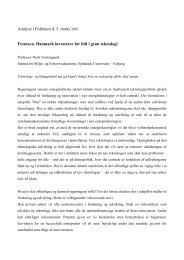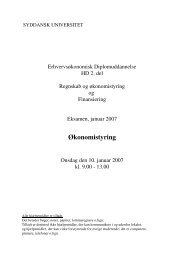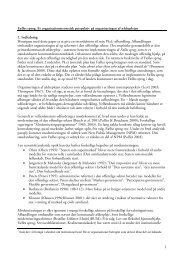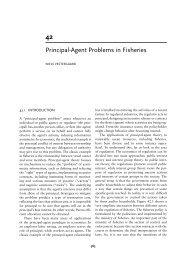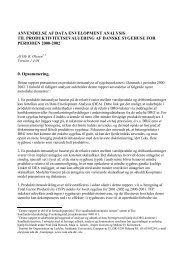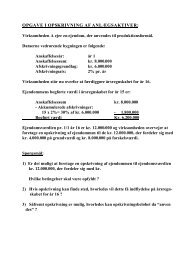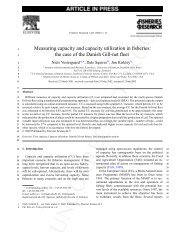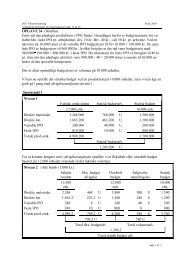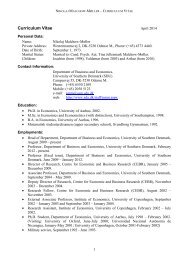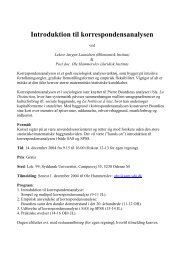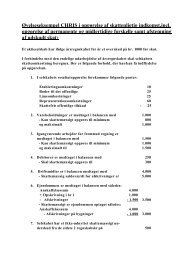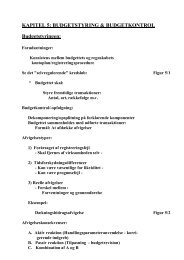well established party culture may re<strong>in</strong>force cohesiveness <strong>and</strong> foster a more lively <strong>and</strong> democraticparty debate.The party culture shall be seen as a part <strong>of</strong> the culture <strong>in</strong> society <strong>in</strong> general. In case <strong>of</strong> the CzechRepublic some observers have called attention to the lack <strong>of</strong> ability to organise, the low solidarity <strong>in</strong>society <strong>and</strong> the widespread opportunism. Furthermore, the low political participation <strong>and</strong> thetradition <strong>of</strong> antipolitics had a negative impact on membership <strong>of</strong> political parties <strong>and</strong> the <strong>in</strong>ternalparty life.The experiences from the dissident period, i.e. the work<strong>in</strong>g “underground” created a certa<strong>in</strong> style <strong>of</strong>political action. Some new parties, e.g. Solidarity <strong>in</strong> Pol<strong>and</strong> was <strong>in</strong> posession <strong>of</strong> a strong liberationmyth. Opposite, <strong>in</strong> Pol<strong>and</strong> the liberation myth was less strik<strong>in</strong>g <strong>in</strong> the Czech Republic, <strong>in</strong> whichcase the break through was very short. Before 1989 the opposition had been weakly organized, butthe anti-political attitudes were strongly represented.after 1989 thereby foster<strong>in</strong>g elite parties withweak l<strong>in</strong>kages to the civil societies. Like the civil societies <strong>in</strong> the broad sense the <strong>in</strong>ternal party lifewas not assigned an important role.In the case <strong>of</strong> Hungary the party culture was to a m<strong>in</strong>or extent l<strong>in</strong>ked to the fight aga<strong>in</strong>st the oldregime, as the former regime had been rather liberal <strong>and</strong> national accomodative <strong>and</strong> the marketeconomy already partly tested. The Czech peoples perception <strong>of</strong> democracy <strong>and</strong> democratic valueswas rather <strong>in</strong>dividualistic 36 <strong>and</strong> the programmatic <strong>and</strong> <strong>in</strong>stitutional shortcom<strong>in</strong>gs tended to makepolitics almost “issueless” (Thomas, 1999:9). In Pol<strong>and</strong> the political culture has been morecollectivistic than <strong>in</strong> the Czech Republic, <strong>in</strong>spired by the tenets from the Catholic church. Thehistoric memories have been a significant ressource, especially at the beg<strong>in</strong>n<strong>in</strong>g <strong>and</strong> <strong>in</strong> the case <strong>of</strong>Solidarity.The feel<strong>in</strong>gs <strong>of</strong> solidarity <strong>in</strong> the fight aga<strong>in</strong>st the state socialist regime have been strong, go<strong>in</strong>g backto upris<strong>in</strong>g <strong>in</strong> 1956 <strong>and</strong> Solidarity <strong>in</strong> 1980-1981. Be<strong>in</strong>g member <strong>of</strong> Solidarity you became a part <strong>of</strong> abigger community (“Us” oppsosite “Them”). The many different party rituals reflected a deeplyrooted party culture, e.g. by group participation <strong>in</strong> services <strong>in</strong> churches <strong>and</strong> to carry party emblems.After the state <strong>of</strong> emergency <strong>in</strong> December 1981 many carried the “pornik”, the opposition badge.The 3 <strong>of</strong> May, the anniversary <strong>of</strong> the 1791 constitution <strong>and</strong> the anniversaries <strong>of</strong> the upris<strong>in</strong>gs <strong>in</strong>1830, 1863 <strong>and</strong> 1944 (the Warsaw upris<strong>in</strong>g) <strong>and</strong> the murder on the priest Popiluski have also beenmarked. The colours <strong>of</strong> the Polish flag was also the colours <strong>of</strong> the Solidarity banner. Thus patriotic<strong>and</strong> religious rituals were l<strong>in</strong>ked to the memories about the fight aga<strong>in</strong>st communist suppression <strong>and</strong>became therefore re-activized dur<strong>in</strong>g election campaigns 37 . Or to conclude, Solidarity was strong onthe symbolic level, but unfortunately too weak <strong>and</strong> divided organizatorically <strong>and</strong> <strong>in</strong>stitutionally.For the (ex)communist parties the years work<strong>in</strong>g underground before <strong>and</strong> under the second worldwar had a special mean<strong>in</strong>g, also the first years after the World War II when tak<strong>in</strong>g political power.In the Stal<strong>in</strong> years the political activities were focus<strong>in</strong>g on the fight aga<strong>in</strong>st “contrarevolutionary”activities <strong>in</strong>side as weel as outside the rul<strong>in</strong>g communist parties. The friendship with the SovietUnion, the showdown between the communist leaders <strong>and</strong> the class enemies <strong>and</strong>contrarevolutionaries fostered an <strong>in</strong>ternal solidarity <strong>and</strong> cohesion, but also a considerable fear <strong>and</strong><strong>in</strong>security. Todays friends might become the enemies <strong>of</strong> tomorrow. Also special festive days <strong>and</strong>36 See e.g. <strong>in</strong>terview with Jiri Musil <strong>in</strong> Gazeta Sro<strong>dk</strong>owoeuropejska, <strong>in</strong> Gazeta Wyborcza 19 February, 1995:13.37 Wlodzimierz Modzelewski (1989), “Symbolika “Solidarnosci””, <strong>in</strong> “Studia nad ruchami spolecznymi tom. II”,Uniwersistet Warszawski, Institut Socjologii, Warszawa.42
evolutionary songs became a part <strong>of</strong> the party culture. After 1989, the fight for recognition <strong>and</strong> thepressure from non-communist groups <strong>and</strong> parties fostered <strong>in</strong>ternal cohesion <strong>and</strong> thereby enhanc<strong>in</strong>gparty <strong>in</strong>stitutionalisation.Opposite, the new non-communist parties had to establish a party culture almost from scratch.Opposite the (post)communist they could do that with “clean h<strong>and</strong>s” <strong>and</strong> without “dead bodies <strong>in</strong>the cargo”. New broad anti-communist civic movements had their roots <strong>in</strong> the fight aga<strong>in</strong>st the oldsystem. Unlike historic non-communist parties they could not survive only by references tomemories about the time before the communist take over. Thus party history <strong>and</strong> the resistanceaga<strong>in</strong>st the state socialist system occupied an important place, but did note ensure the necessary<strong>in</strong>ternal cohesion <strong>and</strong> consensus on the elite level.The revived social democratic parties did their best to l<strong>in</strong>k themselves to the party traditions go<strong>in</strong>gback to the time before the forced unification with the communist parties after WW II, howeverwithout great success. The historic social democratic parties suffered because they had not playedany lead<strong>in</strong>g role <strong>in</strong> opposition the communists <strong>and</strong> under foreign occupation. Thus the commonpantheon <strong>and</strong> collective memories was less developed. Furthermore, <strong>in</strong>ternal fragmentation due togeneration gaps <strong>and</strong> disagreements about the most proper policy l<strong>in</strong>e had as the result that at thefirst free eelections the historical social democratic parties were surpassed by the reformedcommunist parties, which more quickly than expected were able to carry through their own <strong>in</strong>ternaltransformations.For historic reasons conspiration theories were widespread also <strong>in</strong>side the parties, therebyhamper<strong>in</strong>g the development <strong>of</strong> a productive <strong>and</strong> democratic party life. In a way the new partieswere fac<strong>in</strong>g battles on two fronts, aga<strong>in</strong>s enemies <strong>in</strong> their own camps (“the wars <strong>in</strong> the top”) <strong>and</strong>aga<strong>in</strong>st external enemies (“<strong>in</strong>sider-outsider differentials”). Often the political language has beenaggressive <strong>and</strong> not only directed aga<strong>in</strong>st the representatives <strong>of</strong> the old regimes, but also aga<strong>in</strong>stpeople shar<strong>in</strong>g divergent op<strong>in</strong>ions on important policies. By the leaders opponents <strong>of</strong> the party l<strong>in</strong>ehas been called “agents”, “traitors”, “thieves <strong>of</strong> public properties” <strong>and</strong> “foreigners” <strong>and</strong> anti-semiticstatements have not been totally absent. Thus, the political debates <strong>and</strong> the political languagebetween <strong>and</strong> <strong>in</strong>side parties tended to be signified by a “language <strong>of</strong> aggression” <strong>and</strong> a “language <strong>of</strong>attacks” 38 .II. About parties <strong>and</strong> party-systems <strong>in</strong> Pol<strong>and</strong>2.1. Path-dependency <strong>and</strong> the parties <strong>and</strong> party-systems <strong>in</strong> Pol<strong>and</strong>In a path dependency perspective the Polish transition shall be seen <strong>in</strong> the context <strong>of</strong> “thephilosophy” <strong>of</strong> the round table discussions (“Magdalenka”) 1988-89, <strong>and</strong> “the Balcerowicz plan I”,for no gevernmental parties have been able to liberate themselves from the legacy <strong>of</strong> the round tablenegotiations (“Magdalenka”) <strong>and</strong> the Balcerowicz plan despite proclamations about do<strong>in</strong>g so.Furthermore, the political capital, i.e. the spontaneous popular support, faded out before than first38 Jan<strong>in</strong>a Fras, “Political discourse <strong>in</strong> post-Communist Pol<strong>and</strong>”, <strong>in</strong> Andrzej W. Jablonski, Gerd Meyer (1996):155-159.43
- Page 3: “This provisional situation chara
- Page 6 and 7: marketisation and privatisationshor
- Page 8 and 9: purposes, are channels for “expre
- Page 10 and 11: the significance of strategic choic
- Page 12 and 13: presidentialism gave rise to “flo
- Page 14 and 15: antipolitics and reinforcement of a
- Page 16 and 17: In the late 1990’s elections most
- Page 18 and 19: determined primarily by “politica
- Page 20 and 21: politics and antipolitics, all sign
- Page 22 and 23: which attitudes to state regulation
- Page 24 and 25: Anti-communism has been defined in
- Page 26 and 27: elections and the Slovak communists
- Page 28 and 29: Cartel agreementsbetter representat
- Page 30 and 31: Basically the absence of clear cons
- Page 32 and 33: After 1989 different types of polit
- Page 34 and 35: complex project for transition unde
- Page 36 and 37: window of opportunity in spite of s
- Page 38 and 39: analyses of party institutionalizat
- Page 40 and 41: political messages and slogans. Thu
- Page 44 and 45: expected, much due to the many spli
- Page 46 and 47: Furthermore, the polarisation on el
- Page 48 and 49: Finally, Solidarity can also be con
- Page 50 and 51: whole, on the one side an authorita
- Page 52 and 53: The economic recession and the grav
- Page 54 and 55: election defeat more cooperation an
- Page 56 and 57: The formation of AWS can be conside
- Page 58 and 59: group. RS AWS constituted the Chris
- Page 60 and 61: According to the original plans the
- Page 62 and 63: values. According to Rybicki, as so
- Page 64 and 65: AWS should fight against all types
- Page 66 and 67: 2001 parliamentary election, howeve
- Page 68 and 69: and workers voted ZChN. At the 1993
- Page 70 and 71: The League has been considered as a
- Page 72 and 73: establishment like than LPR’s. Th
- Page 74 and 75: jobs in rural areas, especially sma
- Page 76 and 77: industrial policy. According to the
- Page 78 and 79: pressurizing the government to give
- Page 80 and 81: democrats, thereby locating itself
- Page 82 and 83: To conclude, the Freedom Union (UW)
- Page 84 and 85: Polish middle class. Thus, in Janua
- Page 86 and 87: such as KSCM and KSS in The Czech R
- Page 88 and 89: The SLD leaders were mainly recruit
- Page 90 and 91: the falling popular support for pri
- Page 92 and 93:
innovation was formation of the pol
- Page 94 and 95:
place after talks with each applica
- Page 96 and 97:
Has the Left any freedom of manoeuv
- Page 98 and 99:
medicine, changes in the labour cod
- Page 100 and 101:
The Labour Union (UP), Democratic U
- Page 102:
Nevertheless, before that had taken



